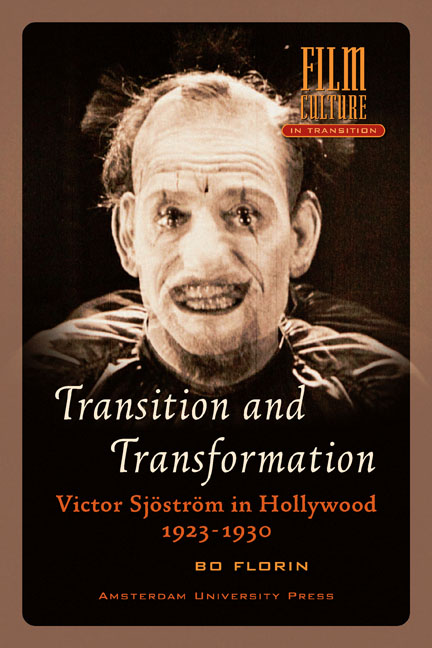Book contents
- Frontmatter
- Contents
- Acknowledgements
- Introduction – From Sjöström to Seastrom
- Sjöström – From National to International
- A European in Hollywood – NAME THE MAN and the Shift of Production Systems
- From Scientist to Clown – HE WHO GETS SLAPPED
- A for Adultery – THE SCARLET LETTER
- Conquering Nature – THE WIND
- Fragmented Pieces – Writing the History of the Lost Hollywood Films
- The Shadow of the Silents – A LADY TO LOVE
- The Genius and the System– Some Concluding Remarks
- Notes
- Bibliography
- Filmography
- Index
- Film Culture in Transition
From Scientist to Clown – HE WHO GETS SLAPPED
Published online by Cambridge University Press: 22 December 2020
- Frontmatter
- Contents
- Acknowledgements
- Introduction – From Sjöström to Seastrom
- Sjöström – From National to International
- A European in Hollywood – NAME THE MAN and the Shift of Production Systems
- From Scientist to Clown – HE WHO GETS SLAPPED
- A for Adultery – THE SCARLET LETTER
- Conquering Nature – THE WIND
- Fragmented Pieces – Writing the History of the Lost Hollywood Films
- The Shadow of the Silents – A LADY TO LOVE
- The Genius and the System– Some Concluding Remarks
- Notes
- Bibliography
- Filmography
- Index
- Film Culture in Transition
Summary
Sjöström's second film in Hollywood, HE WHO GETS SLAPPED, was shot under the aegis of the newly established MGM company, which launched “Seastrom” as one of its first directors. After finishing NAME THE MAN, Sjöström was offered a new script called “A Tree in the Garden”, written by Hjalmar Bergman, but to Bergman's great disappointment, he expressed his scepticism towards this scenario, in which he had himself been involved. It should be noted that Sjöström had already made four films based on Bergman's scripts in Sweden, and it was to a large extent through Sjöström's mediation that Bergman had come to Hollywood.
However, “A Tree in the Garden” also had a prehistory. Upon his arrival in Hollywood, Hjalmar Bergman was asked by Goldwyn Pictures to write a script for Sjöström based on another novel by Hall Caine: The Bondman: A New Saga 1890). This project, however, was declined due to financial reasons. Bergman then took an initiative of his own: to write a synopsis based on Ibsen's play Bygmester Solness (The Master Builder) (1892). This project, however, was refused by Abraham Lehr, head of production at Goldwyn, as it was considered as “not commercial”. Itwas only then that he, upon invitation from Goldwyn, undertook the project based on the novel by Edwin C. Booth, The Tree of Knowledge, which Bergman turned into the synopsis called “A Tree in the Garden”. By that time, the new company MGM had taken over from Goldwyn, which considered this new script to be “not commercial”. Upon Sjöström's comment that this script actually was chosen by Goldwyn for commercial purposes, after declining the Bygmester Solness script for the same reason, Irving Thalberg sarcastically responded that Goldwyn's pictures had generally suffered from being “not commercial”.
Instead, Sjöström now received the suggestion from Irving Thalberg to film Leonid Andreyev's play He Who Gets Slapped. This play had been published in English translation in 1922 and had been staged on Broadway in the same year. The Broadway run was a success and, as a result, Thalberg wanted to bring it to the screen. An original outline for a film script had been written by Albert P. Lewis as early as September 1922.
- Type
- Chapter
- Information
- Transition and TransformationVictor Sjöström in Hollywood 1923–1930, pp. 43 - 62Publisher: Amsterdam University PressPrint publication year: 2013



